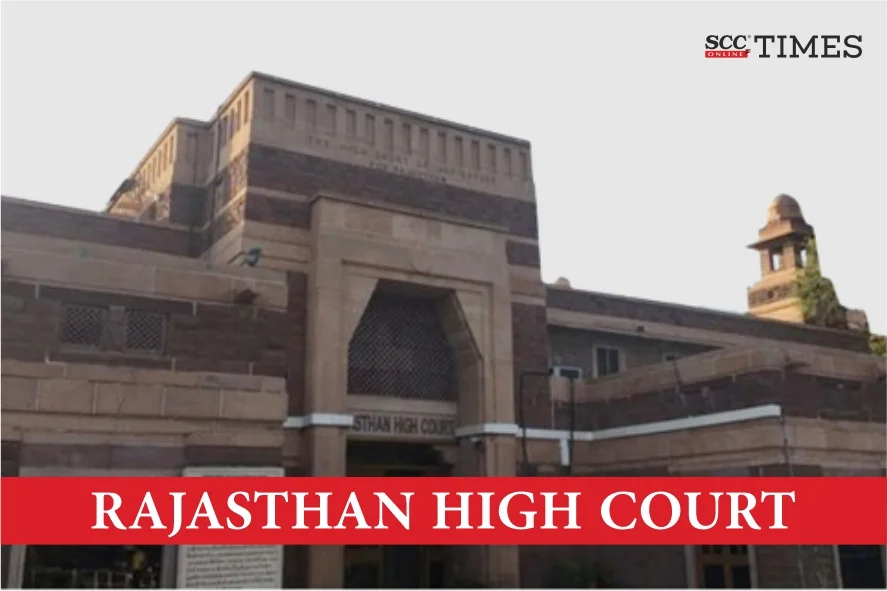Rajasthan High Court: In a writ petition against the disobedience of Court orders to decide the petitioner’s representations by the respondents, a single-judge bench comprising of Anoop Kumar Dhand, J., held that disobedience of court directives undermines the judicial process and erodes public confidence in the legal system. While emphasising on the importance of respecting court orders and maintaining the Rule of Law, the Court issued directions to ensure compliance with its orders and uphold the integrity of the judiciary.
“An order passed, right or wrong, must be obeyed. If the party is affected by any order, he ought to take prompt/diligent steps in resorting to further appellate or revisional proceedings in accordance with law, but in any case, he cannot ignore the order and plead difficulties in implementation of the order passed by the Court.”
Factual Matrix
In the instant matter, the petitioner filed a writ petition seeking various reliefs regarding the regularization and status of a house constructed on a specific plot in Anita Colony, Bajaj Nagar, Jaipur. The petitioner had previously filed two writ petitions in 2008 and 2018, both of which were disposed of by the court with directions to the respondents to decide the petitioner’s representations. Despite the court’s orders, the respondents did not decide the representations submitted by the petitioner, leading to the filing of the instant petition.
The petitioner argued that the respondents had continuously ignored the court’s orders and failed to decide the representations submitted by the petitioner, despite clear directions to do so. The petitioner sought relief from the court to compel the respondents to take action on the pending representations and address the grievances raised. The issue in hand is whether the respondents’ failure to comply with the court’s orders and decide the petitioner’s representations constitutes disobedience of judicial orders and violation of Rule of Law.
Court’s Observation
The Court noted that the respondents had indeed disregarded its previous orders to decide the petitioner’s representations. The Court expressed dismay at the respondents’ continuous disregard for its orders and emphasised on the importance of obeying Court directives to uphold the Rule of Law. The Court opined that “one cannot be allowed to trounce the majesty of law and pollute the streams of justice by brazenly engaging in contemptuous conduct within an aim of hoodwinking the judicial system. The edifice of the vibrant constitutional democracy rests on the pillars of Rule of Law, which needs to be preserved with the vigour to maintain sanctity of judicial proceedings.”
The Court cited Mohd. Aslam v. Union of India, 1994 (6) SCC 442, to underscore the significance of respecting legal institutions and abiding by their decisions. Furthermore, the Court referred to Pawan Meena v. State of Rajasthan, S.B. Civil Writ Petition No.1665/2024, where the Court had directed the Chief Secretary to ensure timely disposal of representations to prevent unnecessary litigation. The Court stated that “an order passed, right or wrong, has to be obeyed.” The Court asserted that if a party is affected by any order, he ought to take prompt/diligent steps in resorting to further appellate or revisional proceedings in accordance with law. The Court held that regardless of the correctness of a court order, parties must obey it and seek recourse through legal channels if aggrieved.
Court’s Directions
In light of the above, the Court issued specific directions:
-
directed the Chief Secretary of the State to establish “Separate Cells” in each department to ensure timely disposal of representations and compliance with court orders.
-
directed the Chief Secretary of the State, Principal Secretary and Secretaries of all the Departments to establish “Redressal Grievance Cell” and mandate for timely disposal of representations.
-
Directed the submission of compliance report within a period of three months from today
-
directed the respondents to decide the petitioner’s representations promptly and warned of contempt proceedings if the respondents failed to comply within the specified timeframe.
-
instructed against coercive action against the petitioner pending compliance.
The Court disposed of the instant writ petition with the aforementioned directions and ordered a copy of the order to be forwarded to relevant authorities for compliance.
[Jagdish Chandra Agarwal v. State of Rajasthan, 2024 SCC OnLine Raj 726, order dated 18-03-2024]
*Judgment by Justice Anoop Kumar Dhand
Advocates who appeared in this case :
Mr. R K Mathur, Senior Advocate and Mr. Aditya Kiran Mathur, Counsel for the Petitioner






